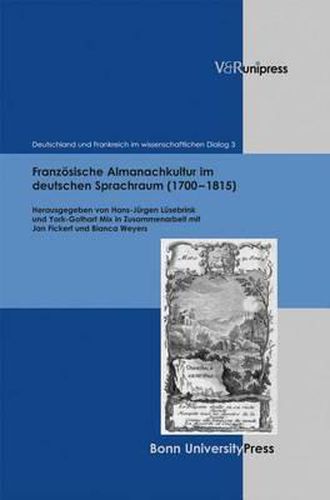Readings Newsletter
Become a Readings Member to make your shopping experience even easier.
Sign in or sign up for free!
You’re not far away from qualifying for FREE standard shipping within Australia
You’ve qualified for FREE standard shipping within Australia
The cart is loading…






Dieser Band widmet sich dem umfassenden Korpus franzoesischsprachiger Almanache, die bis zum Ende der Napoleonischen ara im deutschen Sprach- und Kulturraum gedruckt, verlegt und rezipiert wurden. Er analysiert diese bisher unerschlossenen Quellen aus literatur-, kultur- und medienwissenschaftlicher Perspektive. In 13 Einzelstudien wird deutlich, dass es sich bei den auf ein Elitenpublikum zielenden frankophonen Almanachen um inhaltlich breit gefacherte und in genrespezifischer Hinsicht hoch differenzierte, transkulturell orientierte Periodika handelt. Die Untersuchungen dieses frankophonen Alltagsmediums im deutschsprachigen Raum dokumentieren zudem die Mehrsprachigkeit der Aufklarung und offenbaren ein differenziertes Interesse fur die Kultur der Nachbarnationen, wodurch die Realitat der transkulturellen Verbindungen zwischen den europaischen Literaturen nachdrucklich ins Bewusstsein gehoben wird. This volume introduces the francophone almanacs published in the German linguistic and cultural world by through the end of the Napoleonic era. It additionally analyzes this previously untapped and largely unknown corpus against the backdrop of literary, cultural and media studies. With regards to francophone almanacs targeting an elite audience, it is apparent that the content is wideranging, while the genre is highly differentiated and transculturally oriented. These periodicals may include literary soft-cover books, lady’s almanacs, royal almanacs, theatre almanacs, muses’ almanacs, antirevolutionary almanacs and state almanacs. All of these qualify the general notion of one public, one audience, or the national literatures. Moreover, they impressively document multilingualism of the German Enlightenment in an European context. This also questions the paradigm shift to the English culture from 1770 onwards, established by historiography, and basically taps a field ignored by national philology.
$9.00 standard shipping within Australia
FREE standard shipping within Australia for orders over $100.00
Express & International shipping calculated at checkout
Dieser Band widmet sich dem umfassenden Korpus franzoesischsprachiger Almanache, die bis zum Ende der Napoleonischen ara im deutschen Sprach- und Kulturraum gedruckt, verlegt und rezipiert wurden. Er analysiert diese bisher unerschlossenen Quellen aus literatur-, kultur- und medienwissenschaftlicher Perspektive. In 13 Einzelstudien wird deutlich, dass es sich bei den auf ein Elitenpublikum zielenden frankophonen Almanachen um inhaltlich breit gefacherte und in genrespezifischer Hinsicht hoch differenzierte, transkulturell orientierte Periodika handelt. Die Untersuchungen dieses frankophonen Alltagsmediums im deutschsprachigen Raum dokumentieren zudem die Mehrsprachigkeit der Aufklarung und offenbaren ein differenziertes Interesse fur die Kultur der Nachbarnationen, wodurch die Realitat der transkulturellen Verbindungen zwischen den europaischen Literaturen nachdrucklich ins Bewusstsein gehoben wird. This volume introduces the francophone almanacs published in the German linguistic and cultural world by through the end of the Napoleonic era. It additionally analyzes this previously untapped and largely unknown corpus against the backdrop of literary, cultural and media studies. With regards to francophone almanacs targeting an elite audience, it is apparent that the content is wideranging, while the genre is highly differentiated and transculturally oriented. These periodicals may include literary soft-cover books, lady’s almanacs, royal almanacs, theatre almanacs, muses’ almanacs, antirevolutionary almanacs and state almanacs. All of these qualify the general notion of one public, one audience, or the national literatures. Moreover, they impressively document multilingualism of the German Enlightenment in an European context. This also questions the paradigm shift to the English culture from 1770 onwards, established by historiography, and basically taps a field ignored by national philology.